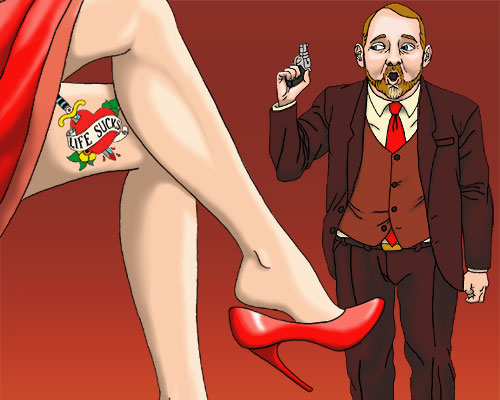Theater J presents the brilliant and highly poignant new Aaron Posner play Life Sucks (Or the Present Ridiculous.) Written and subsequently Directed by Posner himself, this irreverent modern variation on Chekhov’s Uncle Vanya, is a gloriously thought-provoking work that captures the minds of the audiences through laughter, tears, and strange situations. This world premier work is quite possibly the most connective piece of work to address humans as they exist in the world; a remarkable script which nurtures the human psyche in the most evocative way possible. With earnest compassion, raw experience, and realistic truths this play about love and loss makes for a pleasant two-hour traffic jam upon the Theater J stage.
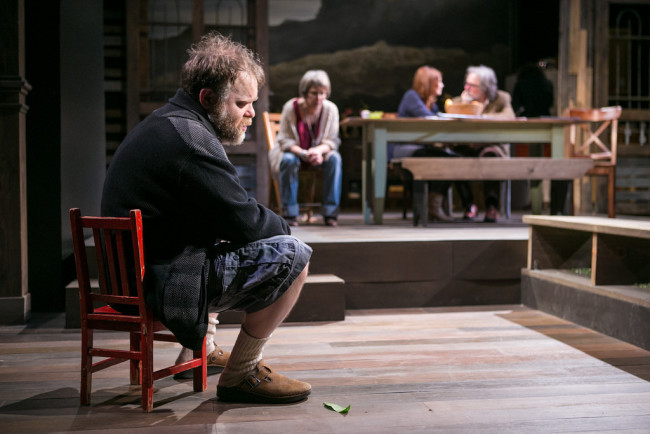
The craftsmanship of the Set Designer Meghan Raham is superb. An old-worldly rustic look sprawls across the stage from the downstage interior areas that flank the left of the stage to the pastoral wheat field that fills in the upstage background. The hanging swing is a delicate yet purposeful touch; in a Chekhov play— even if it is just a wildly irreverent variation— everything must have a place and purpose and Raham adheres to that theatrical rule with precision. Her uses of muted earth tones throughout the set further inspires the recollection of Chekhov’s original work; juxtaposed against the wooded blues of the swing creates a noticeable contrast of modernism and antiquity.
Lighting Designer Nancy Schertler falls to the whims of Posner’s irreverent work. With a series of ups and downs in the main house lights whenever the characters need to address the audience directly, Schertler designs precision moments of fade-up and fade-down to make these moments feel natural and yet alienating simultaneously. The fairy lights strung out over the house are an additional touch of curiously quaint sentiment; drawing the audience into the love and loss aspect of the performance.
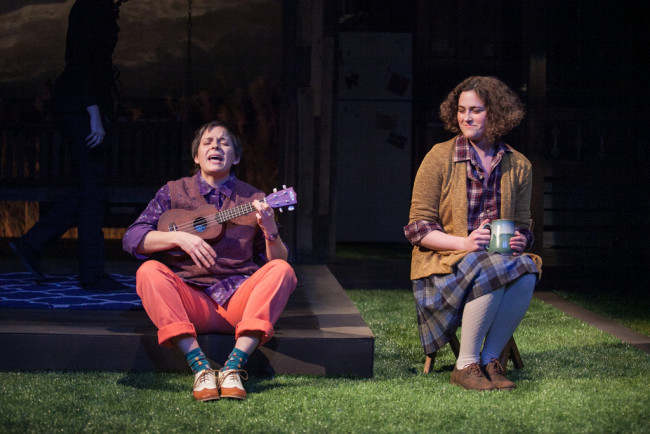
Posner’s work is nothing short of phenomenal. Tackling the issues of quotidian life and extrapolating their deeply existential yet simultaneously surface means, the play works as a multifaceted learning lesson with liberal doses of relatable reality sprayed throughout its existence. It is above all an interactive theatrical experience; an evening or afternoon of metatheatre wherein life imitates art imitating life imitating art through life. If that last sentence was confusing the production is going to especially entertaining for you. Posner manages to not only capture the essence of humanity at its core but explodes it apart into is simplest of pieces before reconstructing it with all of the complex notions we human beings call emotions.
As the show’s director, Posner envelops the essence of Chekhov in a fashion that is deeply satisfying to the modern audience. The infusion of Kimberly Gilbert’s dulcetly unique voice and thrumming of her ukulele whilst singing Beatles’ songs is sheer genius. Gilbert, having appeared in Posner’s previous work Stupid Fucking Bird, is a welcomed reminder that characters, storylines, plots, and themes all overlap in Chekhov’s original works as well they should in Posner’s. The irony and symbolism of the songs selected is apparent and refreshing; a vessel for adding further simplistic joy to the toils of life as it were.
Posner constructs characters and dialogue with fluidity and grace while still managing to make them spastic, dynamic, and utterly genuine. Despite the names and similar characteristics of Chekhov’s original creations, the characters created within the work are the everyman of our modern society. Powerful speeches, often directed at the audience, address these worldly topics of living, aging, loving, losing, and dying and do so with a mesmerizing blend of certitude and confusion. Nothing in life is certain why should any of the viewpoints in this play reflect anything other than that notion? Posner’s brilliance in capturing this and dozens of other real-life notions makes the work truly memorable; well worthy of the 100-year legacy test which is referenced in the performance.
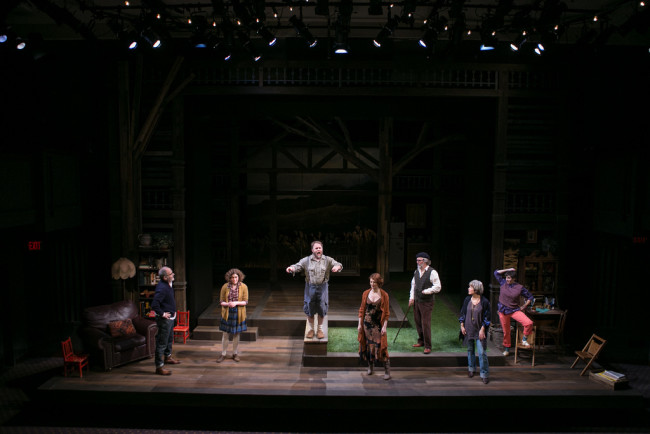
Directing a cast of seven, Posner brings the raw vulnerabilities of humanity to light through a talented cast of exceptional performers. Working as an ensemble, the messages of life and all its finery and absurdity are delivered with resplendence to eagerly awaiting audiences who savor the jokes of the universe as heartily as they digest the heavier unpleasant facts of life. Remarkable chemistry is shared among all of them, humorous exchanges and an authentic feel of understanding life even when they don’t understand it. Posner includes a series of scenes that speak universally to the audience; true ensemble moments that delight the fancy and engage the mind. “Things I love/Things I hate” and the blocking in these scenes— seemingly arbitrary sprinkling of actors across the stage— reflects the divinity of the universe and it’s tendency to err on the side of randomness. As each actor speaks their piece in these scenes a universality arises in their individuality; so specific in their existence as the performers describe them that they become broad and obtainable to the everyman.
Pickles (Kimberly Gilbert) appears at first as a device character but upon further inspection is really representative of the outsider looking in. Gilbert finds a deceptively simplistic energy for the character which makes her quirky and unusual; a solid match for the words which often fly without preamble from her mouth. There is an emotionally charged rant about “past tense love” that Gilbert delivers early on that is such a shocking opposite of the carefully constructed character that it is utterly mind-blowing.
Babs (Naomi Jacobson) is a jarring, albeit humorous, shock to the dynamic of characters displayed upon the stage. Jacobson has a backhanded wit delivered with a delicate balance of clipped sarcasm and jaded mellowness. Much like Gilbert’s character there comes a moment when the portrayal shifts drastically and the audience is once again stunned by the change. Jacobson is a pistol; on point, on fire, and hitting four out of the six times she shoots.
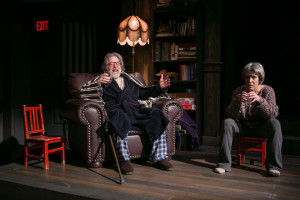
The Professor (John Lescault) embodies the Posner’s definition of academics: “…privileged arrogant fucks that argue endlessly about esoteric minutia…” Lescault adapts the poised and polished stature and articulation of words when it comes to delivering the pedantic overinflated knowledge of his character. Lescault also unearths a delicate vulnerability in this character later in the performance wherein a subtle shift in vocal tone takes him from a pompous puffed-up prick to an insecure inferior insect of a man that no longer has certainty of his own self worth in the grander scheme of things.
Sonia (Judith Ingber) who has the least of the fourth-wall destruction scenes, does have a fairly informal conversation with the audience when it comes to quaintly and politely trying to map out who is who in regards to the traffic of the stage. Ingber’s rapid oscillation between sane and insane are swallowed in a moment by the all consuming “L” word. Her narrative of the radiant invisible butterflies is enchanting and touches the soul in a soft spot fondly reminiscent of childhood. Her explosive rant that follows this magically enticing scene displays her vast versatility as a performer.
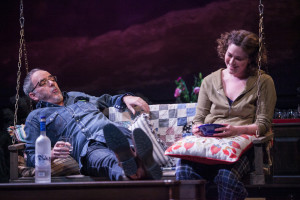
Astor (Eric Hissom) feels out of place at first in the production but quickly falls into his slot based on the attention of others. Wanting Ella, being pined over by Sonia, needing to save Vanya; all of these secondary and tertiary functions of Hissom’s character make him a blank canvas for working on and make his portrayal of the character uniquely inspiring. Hissom delivers a severe reality check to Vanya near the end of the production and this becomes his character’s defining moment; a compelling monologue that pushes the audience right to the edge of their seats.
Vanya (Sasha Olinick) is the most stereotypical of the Chekhovian characters. Olinick delves deep into the morose melancholy of Vanya’s depression once it sets in; a striking replication of Chekhov’s deeply distraught original character. Olinick balances the quirky humors of his character in the earlier scenes against this intense gravity of the end of the performance with great skill; a true man of the craft in his ability to make both sides of his character so thoroughly realistic and believable.
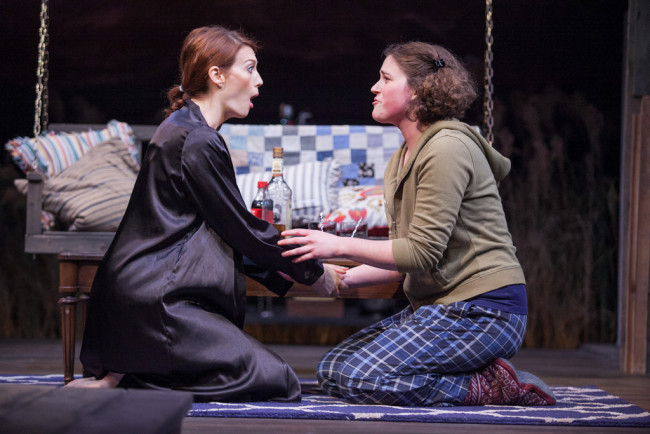
Ella (Monica West) is laden with the speeches that directly address so many of the most poignant notions in the performance. West, who has a great bit where she engages the audience quite humorously, takes solace in her character’s furies as well as her flights of fancy. Biting yet sincere, honest yet elaborate, the way in which West delivers Ella seems to shift with each encounter of a new character, particularly in the frantic exchanges with Sonia. Her congenial nature which surfaces often during addresses to other characters as well as the audience allows her character accessibility to all watching.
As Posner says, people are generally fucked up but so fascinating; Life Sucks (Or the Present Ridiculous) is no exception to that saying. Everyone loves a play that reflects their own lives— no matter how bizarre— directly onto the stage, and this is a play that does so with sensational results.
Running Time: 2 hours and 20 minutes with one intermission
Life Sucks (Or the Present Ridiculous) plays through February 15, 2015 at Theater J— at the Washington DC Jewish Community Center— 1529 16th Street NW in Washington, DC. For tickets call the box office at (202) 518-9400 or purchase them online.

